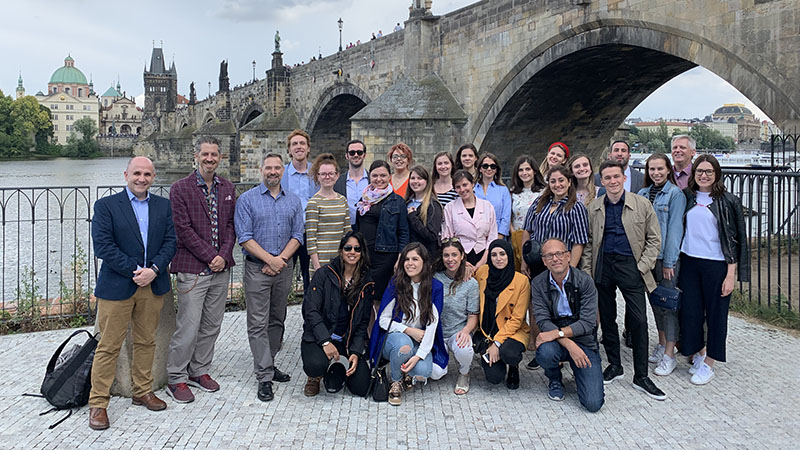
Photojournalism, religion, data science, politics and philosophy may seem like an unusual combination, but 22 participants from 14 countries came together and explored these subjects to learn the value of the free press in a free society at the 2019 European Journalism Institute (EJI) in Prague this summer.
This program gave me faith in the future of media and journalism… this gave me a renewed understanding that there is meaning to what we are doing.” – Joanna Jasińska ’19
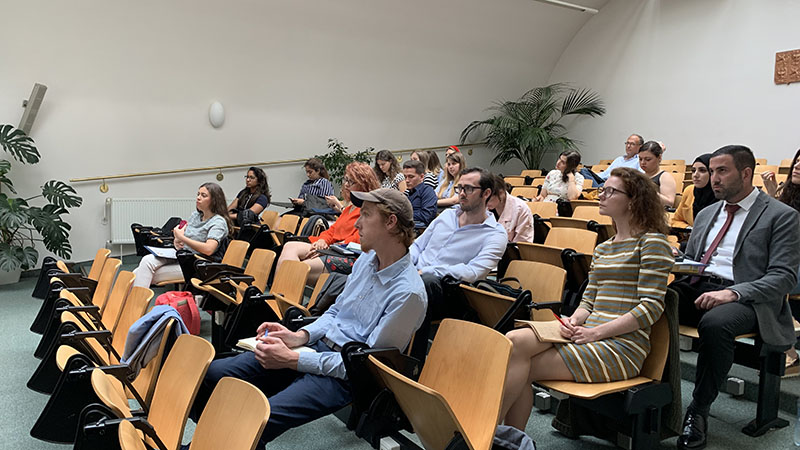
Joanna Jasińska ’19, a journalist with the Polish Press Agency who moved into the journalism field after working in diplomacy for six years, said the program taught her why there is a growing need for proper, fact-based journalism.
“This program gave me faith in the future of media and journalism,” Jasińska said. “There are many trends happening right now that could fill you with pessimism about journalism, but this gave me a renewed understanding that there is real, important meaning behind what we are doing.”
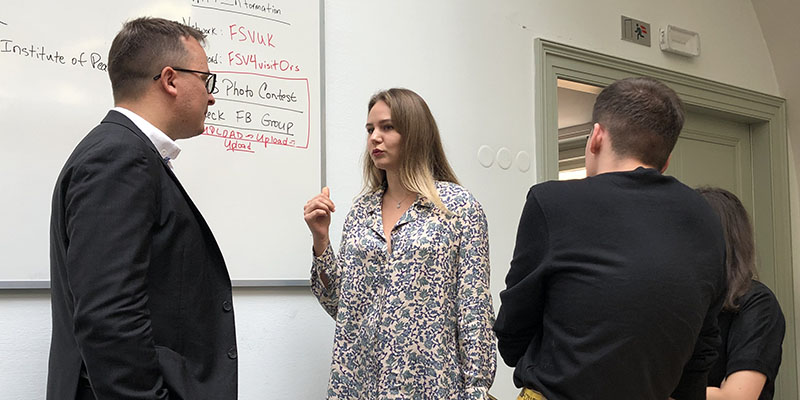
During this fast-paced, one-week summer program, The Fund for American Studies (TFAS) and our program partner The Media Project (TMP) introduced new ideas to student and working journalists from around the world. Through interactive lessons and discussion sessions, faculty brought forth important ideas surrounding journalistic integrity, threats in spreading disinformation, conflict and religion reporting, media bias and ethics.
This year’s returning EJI faculty were TFAS alumnus Paul Glader ’99, ’00, journalism professor at The King’s College and executive director of The Media Project; David Rocks, senior editor at Bloomberg News in Berlin; Sean Gallup, Germany chief news photographer for Getty Images; and TFAS alumnus Ibrahim Al-Marashi ’01, associate professor of Middle East History at California State University, San Marcos.
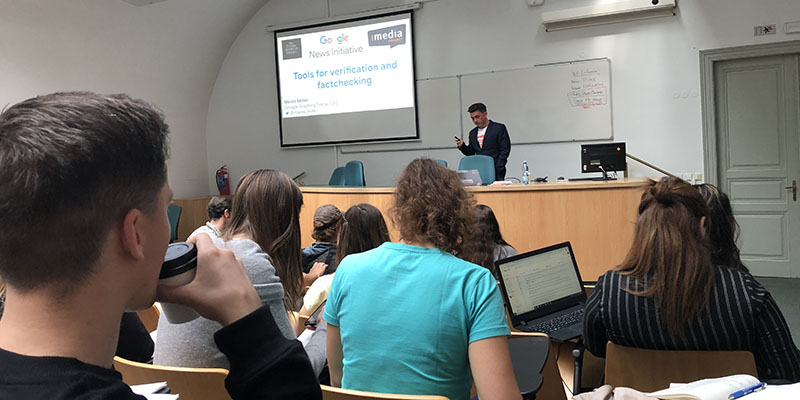
Participant Kateryna Hatsenko ’19, a fourth-year student at Oles Honchar Dnipro National University in Ukraine, said she became more interested in religious studies after hearing Al-Marashi’s lectures at EJI.
“I realized that having a deep knowledge of different religions and cultures will help me in all writing materials,” said Hatsenko. “Our wonderful professor Ibrahim Al-Marashi explained how religion affects political and economic relations.”
In addition to the returning professors, five adjunct faculty including Markus Spieker of Medium German Broadcasting; TFAS alumnus Jakub Janda ’13, head of the Kremlin Watch program and director of the European Values think tank; TFAS alumnus Marek Miller ’01, ’06, a teaching fellow at Google News Lab; Daniel Raus, a poet, author and former editor-in-chief of Czech Radio Plus; and Franak Viacorka, vice president of the Digital Communication Network and creative director at Radio Free Europe/Radio Liberty Belarus Service, shared practical reporting tools and inspirational lessons through discussions and hands-on workshops.
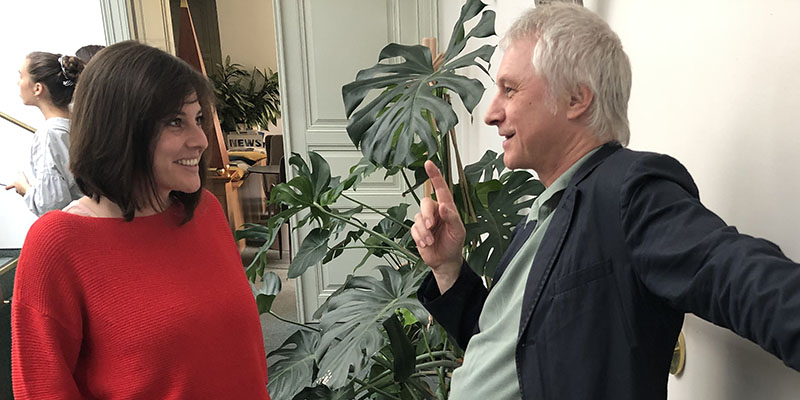
Daria Malinina ’19, a film critic student at the University of Turin in Italy, said Spieker’s lesson not only taught the qualities of good journalism, but also that finding true meaning in sound journalism and storytelling requires empathy.
“I enjoyed the philosophical and psychological side of Spieker’s discussion,” Malinina said. “He structured ‘what a good journalist should do’ from the bottom up – starting with energy and heart. I learned that you can search and read to find truth, but he really brought the heart back to our discussion.”
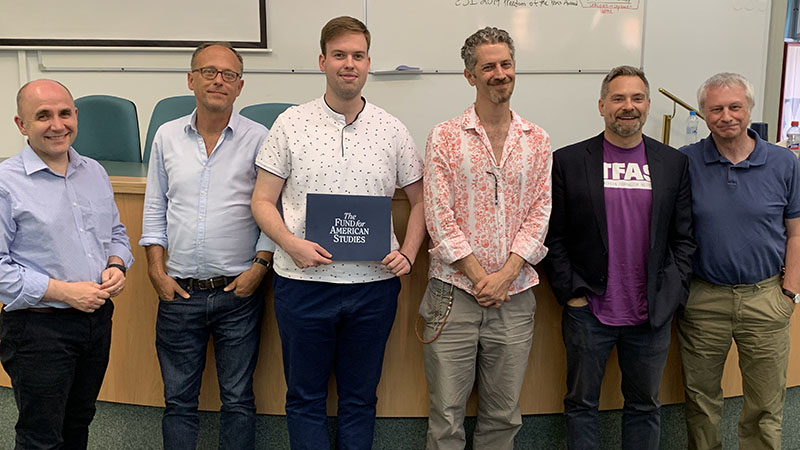
Malinina said the EJI program also provided her with a unique way to continue her studies over the summer and connected her with a global network of peers working in journalism.
“For me, the program was a really important way to make connections and gain new knowledge and new tools,” she said. “It was valuable to see how journalism works in other countries.”
Echoing Malinina’s sentiment, Jasińska shared that it was also curiosity – a common characteristic of all journalists – that brought the participants even closer.
“We are all curious about the world and about other people,” Jasińska said. “For me, it didn’t matter if someone was from Ukraine, the U.S., Palestine or Kosovo, they came from different places but they always have new perspectives and new experiences. We shared our countries and cultures to learn from each other, but more often than we realized, we learned we have so many things in common.”
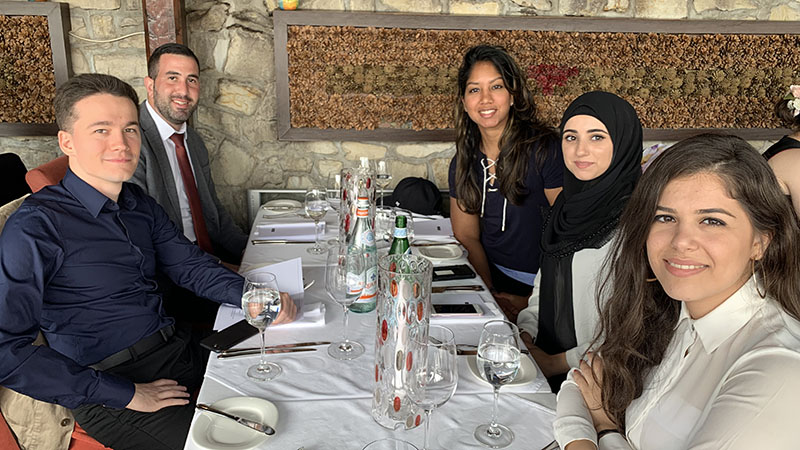
This shared cultural experience was beneficial both inside and outside of the classroom because it allowed her to grow and learn from peers from other parts of the world.
“When you want to learn, you cannot learn only from your own country and its perspective because you will not get the whole story,” she said. “We need to speak to people who are different – it’s a crucial aspect of learning about yourself and about the world.”
As the program concluded, TFAS and TMP presented David Blevins from Sky News in North Ireland with the 2019 EJI Freedom of the Press Award for his accuracy and integrity in reporting as a safeguard to democracy.
Blevins dedicated the award to the late Lyra McKee, a journalist from Northern Ireland who was fatally shot this year while reporting on riots in the Creggan area of Derry, Northern Ireland. Blevins, who notably covered much of the Irish peace process himself, spoke to the class about the media’s crucial role in times of distress.
Participant Viktorya Muradyan ’19 of Armenia shared that she could identify with Mr. Blevins lecture because she understood the impacts of growing up in a conflict zone.
“His lecture gave me a desire to fill myself and others with hope,” she said. “The only way I can do it is through my writing, through journalism.”
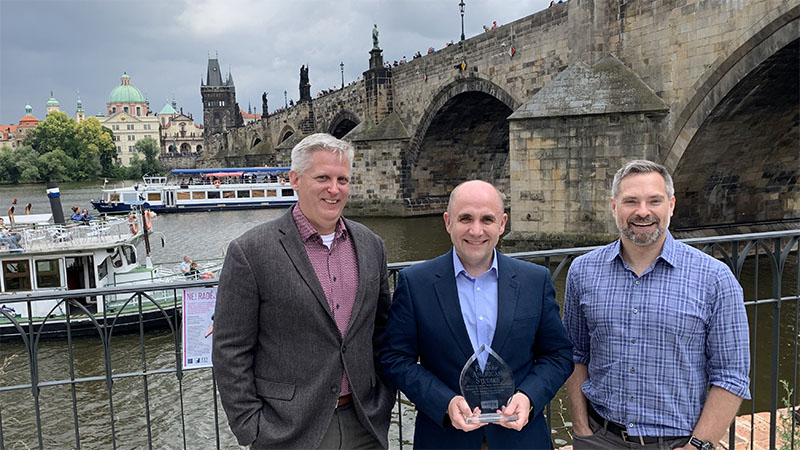
Following a week of exploring these vital issues in journalism, Jasińska said she walked away with a gratitude for a deeper understanding of truth and accuracy in reporting.
“We live in a very complicated world in very complicated times, so people who can explain this world are very important,” she said. “It makes sense to invest in young journalists so we can learn how to present some truth about everything going on around us.”
This year’s program marks the third year of the relaunched European Journalism Institute, which first ran from 2004 to 2011. To learn more about the program, please visit TFAS.org/EJI.
Apply To EJI 2020
2019 EJI participants:
Sandra Abdelbaki
Lebanon
Freelancer and Student,
Lebanese American University in Beirut
Brittany Bhulai
United States
Reporter, New York Daily News
Irina Chevtaeva
Russia
Correspondent, News and Social Media Editor, Deutsche Welle (DW), Russian Language Service
Suzanna Goussous
Jordan
Student, Budapest Business School (BGE)
Kateryna Hatsenko
Ukraine
Freelancer and Student, Oles Honchar Dnipro National University
Daniella Horvath
Hungary
Student and Teaching Assistant, Florida State University
Vladyslav Iatskiv
Ukraine
Senior Digital Producer, Radio Free Europe / Radio Liberty
Joanna Jasińska
Poland
Journalist, Polish Press Agency
Anna Johansen
United States
Correspondent, WORLD News Group
Musa Khalil
Palestine
Head of Mission Assistant for Media and Public Affairs, Temporary
International Presence in Hebron
Kafa Khalil
Lebanon
Student, Lebanese American University
Iryna Ladyka
Ukraine
Student, Ivan Franko National University of Lviv
Daria Malinina
Ukraine and Italy
Student, University of Turin
Benjamin Mandile
United States
Student, Fort Lewis College
Yarah Moussawi
Lebanon
News Writer and Reporter, Hassan Saad
Viktorya Muradyan
Armenia
Client Support and Communication Intern, AIRBUS
Victoria Petrova
Bulgaria
Head of Educational Activity, “Queen Sofia Ispanska” Private School
Catalina Ramos
Chile
Journalist for the Public Relations and Press Department, Municipality of Las Condes
Ana Smrekar
Slovenia
Student, University of Ljubljana
Bukureza Surdulli
Kosovo
Program Assistant, National Democratic Institute (NDI) Kosovo
Erik Trautman
United States
Legal Waiver Writer, Broyles Kight & Ricafort, PC
Jovan Tripkovic
Serbia
Freelancer & Graduate Student, Caldwell College
Diana Zsoldos
Hungary
Communication Consultant, IBM

